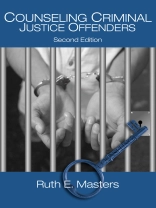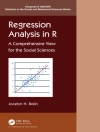‘Excellent book, the best I have read.’
—John Mc Cullogh,
South Hills Business School
Counseling Criminal Justice Offenders, Second Edition takes a practical view of offenders, their problems, and the difficulties counselors face working with them in criminal justice settings. Author Ruth E. Masters examines criminal justice counseling on an individual and group basis and in a variety of settings such as prisons, probation and parole agencies, diversion programs, group homes, halfway houses, prerelease facilities, and U.S. jails. The book also explores the many faces of offenders — young, old, male, female, and across many cultures.
The Second Edition of Counseling Criminal Justice Offenders recognizes that individuals who counsel offenders in the criminal justice system often have not had the extensive training of a licensed psychologist and this text is designed to provide readers with an understanding of the counseling process. The book explores practical knowledge of legal principles, appropriate and effective counselor attitudes, and the past and present protocols of American corrections.
Features and Benefits:
- Each chapter begins with Chapter Highlights and Key Terms and ends with corresponding exercises and discussion questions.
- A section at the end of each chapter lists relevant Internet sites and suggested readings.
- The book includes Counselor/Offender role-play scenarios that prepare students for situations such as how to restore order over a group counseling session, handle their own personal feelings about an offender, and much more.
- An Instructor’s Manual including test items and skill-building exercises is available.
New to the Second Edition:
- Chapters have been reorganized to emphasize the importance of counselors creating an alliance with offenders.
- Discussions have been updated on topics such as multicultural counseling, counseling victims, counseling paraprofessionals, cognitive-behavioral counseling, multimodal counseling, brief counseling, and counseling outcome effectiveness.
- New chapters have been added on counseling criminal psychopaths, the role of emotions in the counseling process, counseling male and female offenders, and the relationship between trauma, addiction, and human behavior.
Primarily designed for criminal justice students taking correctional counseling courses, Counseling Criminal Justice Offenders, Second Edition is also a vital resource for any Criminal Justice, Social Work, Psychology, or Counseling practitioner interfacing with offenders.
Table des matières
Preface
Contributors
Chapter 1. Understanding Criminal Justice Counseling
Chapter Highlights
Key Terms
Introduction
Protection of Society
Rhetoric
Supervision
Communication
Counseling versus Therapy
Roles Criminal Justice Counselors Play
Criminal Justice Counseling and Burnout
Ethical Considerations in Criminal Justice Counseling
Summary
Matching Key Terms and Definitions
Discussion Questions
Counselor/Offender Role-Play Scenarios
Internet Sites
References
Suggested Readings
Chapter 2. Criminal Justice Counseling Process
Chapter Highlights
Key Terms
Introduction
The Beginning of Counseling
The Middle of Counseling
The End of Counseling
Summary
Matching Key Terms and Definitions
Discussion Questions
Counselor/Offender Role-Play Scenarios
Internet Sites
References
Suggested Readings
Chapter 3. The Role and Importance of Emotions in Counseling Criminal
Justice Offenders
Chapter Highlights
Key Terms
Introduction
Development and Structure of the Brain
Definition of Emotion
Core Emotions
Emotional Capacity and Development
Emotions, Human Empathy, and Criminality
Child Abuse, the Brain, and Counseling Offenders
Summary
Matching Key Terms and Definitions
Discussion Questions
Counselor/Offender Role-Play Scenarios
Internet Sites
References
Suggested Readings
Chapter 4. Counseling and the Criminal Justice Offender
Chapter Highlights
Key Terms
Introduction
Young Offenders
Adult Offenders
Addicted and Substance-Abusing Offenders
Disturbed Offenders
Violent Offenders
Female Offenders
Ill Offenders
Sex Offenders
Resistant Offenders
Incarcerated Offenders
Multicultural and Ethnically Diverse Offenders
Military Offenders
Foreign Born Offenders
Older and Elderly Offenders
Mentally Retarded Offenders
Summary
Matching Key Terms and Definitions
Discussion Questions
Counselor/Offender Role-Play Scenarios
Internet Sites
References
Suggested Readings
Chapter 5. Counseling Differences in Male and Female Criminal Justice Offenders
Chapter Highlights
Key Terms
Introduction
Female and Male Communication Differences
Awareness Principles for Female and Male Criminal Justice Offenders
Theodora Wells′ Male/Female Awareness Exercise
Summary
Matching Key Terms and Definitions
Discussion Questions
Counselor/Offender Role-Play Scenarios
Internet Sites
References
Suggested Readings
Chapter 6. Treating the Criminal Psychopath – Candice Skrapec
Chapter Highlights
Key Terms
Introduction
Treatment Outcome
Summary
Matching Key Terms and Definitions
Discussion Questions
Counselor/Offender Role-Play Scenarios
Internet Sites
References
Chapter 7. Trauma, the Addiction Model, and Repetitive Criminal Behavior
Chapter Highlights
Key Terms
Introduction
The Brain and Obsessive-Compulsive Disorder
Trauma and Post-Traumatic Stress Disorder (PTSD)
The Addiction Model
Treatment of Trauma and Repetitive Criminality
Summary
Matching Key Terms and Definitions
Counselor/Offender Role-Play Scenarios
Discussion Questions
Internet Sites
References
Suggested Readings
Chapter 8. Ethical and Legal Concerns in Counseling Criminal Justice Offenders – Lester P. Pincu
Chapter Highlights
Key Terms
Introduction
Ethical Concerns and Confidentiality
Ethical and Legal Issues Regarding Counseling Persons with AIDS and HIV within the Criminal Justice System
Legal Issues Regarding Counseling Incarcerated Offenders
Summary
Matching Key Terms and Definitions
Discussion Questions
Counselor/Offender Role-Play Scenarios
Internet Sites
References
Suggested Readings
Chapter 9. Criminal Justice Counseling Modalities
Chapter Highlights
Key Terms
Introduction
Criminal Justice Counseling Style and Technique
Criminal Justice Counseling Modalities
Other Approaches to Criminal Justice Counseling
Summary
Matching Key Terms and Definitions
Discussion Questions
Counselor/Offender Role-Play Scenarios
Internet Sites
References
Suggested Readings
Chapter 10. Effectiveness of Criminal Justice Counseling
Chapter Highlights
Key Terms
Introduction
Studies of Criminal Justice Counseling Effectiveness
Contemporary Thoughts on What Works in Counseling Criminal Justice Offenders
Contemporary Criminal Justice Treatment Outcome Investigations
Summary
Matching Key Terms and Definitions
Discussion Questions
Internet Sites
Counselor/Offender Role-Play Scenarios
References
Suggested Readings
Glossary
Bibliography
Index
About the Authors
A propos de l’auteur
Professor Ruth Masters has been teaching criminal justice counseling courses at California State University, Fresno since 1970. In addition, she has had hands-on, practical counseling experience in both adult and juvenile criminal justice systems. She has worked as a parole agent for the California Department of Corrections and the California Youth Authority. Her research can be described as a unique blending of theoretical and practical, which includes work in both corrections and law enforcement. Her textbook, Counseling Criminal Justice Offenders (1994), is published by Sage Publications.
Dr. Masters is a member of American Society of Criminology; Academy of Criminal Justice Sciences; Western Society of Criminology; Women′s Criminal Justice Association; California Probation, Parole and Correctional Association; and California State Juvenile Officers′ Association. She received her master′s degree in criminology from California State University, Fresno; and her bachelor′s degree in sociology from the University of California, Berkeley.












